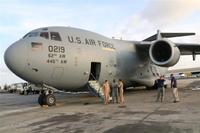-
Debate continues over releasing Pennsylvania crude oil shipment information
Shipment of crude oil by rail in the United States has increased from 800,000 barrels a day in 2012 to 1.4 million in 2014. In western Pennsylvania, over seventy-five million gallons of crude oil are passing through Allegheny and Westmoreland counties to refineries in Philadelphia. Release of the recently classified rail transport records by Pennsylvania Emergency Management Agency (PEMA) was a result of a federal mandate ordering railway companies to share information on interstate shipments of crude oil with state emergency management officials.Railway companies claim that releasing the information threatens security and is commercially sensitive.
-
-
Some states are better prepared than others for climate change challenges
In recent years, a number of states have started taking action to prepare their communities for climate change. Many have even developed specific adaptation plans to guide their work. Until now, though, no one has been able to define how much progress states are actually making in implementing those plans. The Georgetown Climate Center’s (GCC) online tool, the State Adaptation Progress Tracker, changes that. A GCC release says that now, anyone will be able to quickly determine how much progress their state is making and decision-makers will be able to learn from innovative examples of actions other states are taking.
-
-
Open data sources can help localities prepare for disasters
States and local governments must improve their use of open-data sources to prepare for disasters, according to a trio of emergency management experts from academia, government, and the private sector. Experts agreed that public data reveals an increasing need for infrastructure upgrades in U.S. cities, but local governments tend to adopt short-term measures over long-term protections.
-
-
U.S. to commit 4,000 soldiers, $750 million in the next six months to fight Ebola in Africa

The Pentagon’s effort to help eradicate Ebola in West Africa will require roughly 4,000 American soldiers, cost $750 million for the next six months, and may last longer than a year.American troops will help build seven testing labs and seventeen treatment facilities by mid-November, but troops will be on the ground in Liberia for at least a year.A majority of U.S. soldiers will not come in direct contact with Ebola patients, but a few dozen troops trained to operate in nuclear, biological, and chemical environments will be assigned to testing labs.
-
-
Why Western boots should stay out of Iraq and Syria

The main reason why we should ignore the growing calls in the United States, Canada and Australia for Western “boots on ground” — meaning ground troops — to fight and destroy the Islamic State (IS) is this: In Iraq and Syria right now there is no alternative group that could fill the void created by a defeated IS. So even if we could topple IS, who would govern the liberated lands? One of the key lessons we learnt from the Afghanistan and Iraq wars is that military forays cannot succeed without a political solution. Attempting to create such a political solution only after the fact is not something that the world has proven adept at. In the case of IS, there is currently no clear and viable political endgame. So as hard as it might be to accept for some, if defeating IS is the goal, the best solution is likely to be isolate the militants and work to weaken them from within in Iraq – this is what the United States did so successfully in 2006 with the same Sunni groups — while adopting a realpolitik approach to the return of Bashar al-Assad in Syria.
-
-
Four arrested in London in plot to behead people on city streets

Officers from the Metropolitan Police counterterrorism unit early yesterday arrested four young men in London over a suspected terrorist plot to grab people on the streets of London and behead them. One of the four arrested was said to have links to Syria and Islamic State (ISIS). Security analysts have said that ISIS would likely seek to retaliate against the United Kingdom in response to British fighter planes joining the U.S. and Arab states in bombing raids on ISIS targets in Iraq.
-
-
Uncertainty over terrorism insurance act’s renewal upsets industry
The Terrorism Risk Insurance Act (TRIA) is set to expire at the end of this year unless Congress renews the program, which will likely include reforms required by House Republicans. Congress passed TRIA in 2002 after the 9/11 attacks to encourage insurance companies to continue terrorism coverage as part of commercial policies after many feared that doing so would lead to greater financial loss should another terror attack occur.
-
-
State, local governments aim to strengthen cybersecurity staff despite shrinking budgets
Due to increased cyberattacks on state and local government servers, many leaders are looking to strengthen the cybersecurity staff on their payrolls. Lower levels of government are also worried about cybercrime due to the large amounts of personal and confidential data that they store. Demand for cybersecurity experts is more than double the workplace demand for IT specialists.
-
-
New Web privacy system would revolutionize surfing safety
Scientists have built a new system that protects Internet users’ privacy while increasing the flexibility for Web developers to build Web applications that combine data from different Web sites, dramatically improving the safety of surfing the Web. The system, “Confinement with Origin Web Labels,” or COWL, works with Mozilla’s Firefox and the open-source version of Google’s Chrome Web browsers and prevents malicious code in a Web site from leaking sensitive information to unauthorized parties, while allowing code in a Web site to display content drawn from multiple Web sites — an essential function for modern, feature-rich Web applications.
-
-
More law enforcement agencies refuse to hold undocumented inmates for ICE
Recent court rulings have emboldened roughly 225 law enforcement agencies across the country to refuse requests from Immigration and Customs Enforcement(ICE) officials to hold undocumented inmates past their release dates so federal authorities can have time to deport them. Until recently, inmates suspected of being in the country illegally were held for an additional forty-eight hours until ICE agents arrived. Some municipalities began limiting the number of holds a few years ago, but several counties and cities have begun to ignore the requests all together after recent court rulings confirmed that the immigration holds are not mandatory.
-
-
Anti-terrorism plan must tackle “allies” who also fuel radicalism
The coalition of nations stitched together by the United States in response to the developing threat of Islamic State is overlooking the sources of radicalism in the region. This plan not only has nothing to say about these sponsors of terrorism but even empowers fundamentalist groups by forging alliances with them. The U.S.-led alliance includes Saudi Arabia and Qatar. Both countries have been playing counter-productive roles by supporting regional and global Salafi Jihadi movements for a long time. They persist in provoking sectarian strife throughout the region. The emergence of Islamic State cannot be understood without studying its Salafist roots in Saudi Arabia and the financial and media support that has flowed from Qatar. Fighting IS while remaining blind to the sources of radicalism in the region will ultimately be unsuccessful. The only long-term solution is to tackle the source of the problem. This plan must include clear and realistic agendas to reform the education systems of countries in the region, evaluate these U.S. allies’ democratic status, and pressure them to improve their records.
-
-
Is it fair to blame the West for trouble in the Middle East?
For at least a decade, attempts to understand why some young Muslims living in Western countries turn to violence in the name of religion have raised questions about Western foreign policy in the Middle East. Many blame the United States’ foreign policy. The Islamic State uses anger and grievance against Western intervention as a powerful recruiting tool. There is some truth to the argument that anger at foreign policy and the West’s engagement with the Arab world is at the heart of Muslim anger, as well as a driver of radicalization among Muslim youth, but the current state of affairs in the Middle East is not simply an outcome of Western intervention and the U.S.-led invasion of Iraq in 2003. Western foreign policy in the region has no doubt influenced the current situation, but the conditions for the spread of militant Islamism have come from attempts to deal with the crisis within: a crisis that is as much political in nature as it is religious.
-
-
Experts urge caution in relying upon eyewitness identifications in criminal cases
A new report from the National Research Council recommends best practices that law enforcement agencies and courts should follow to improve the likelihood that eyewitness identifications used in criminal cases will be accurate. Science has provided an increasingly clear picture of the inherent limits in human visual perception and memory that can lead to errors, as well as the ways unintentional cues during law enforcement processes can compromise eyewitness identifications, the report says.
-
-
In U.S. criminal courts, non-citizens face harsher sentencing than citizens

Non-Americans in the U.S. federal court system are more likely to be sentenced to prison and for longer terms compared to U.S. citizens, according to a new study. The researchers analyzed U.S. federal district court data from 1992 to 2008 for this study. In 2008, for example, 96 percent of convicted non-citizens received a prison sentence, compared to 85 percent of U.S. citizens. The researchers said that the issue of punishment disparities between citizens and non-citizens is a growing concern as the number of non-citizens in the United States — estimated at more than twenty-two million — continues to grow.
-
-
Law enforcement agencies use technology to compensate for shrinking budgets
With funding shrinking in many sectors of law enforcement, agencies are searching for new ways to operate affordably while maintaining quality standards.Police departments’ budgets quadrupled between 1982 and 2006. With federal budgets shrining, there are simply too many challenges which would not allow for police budgeting-as-usual.
-
More headlines
The long view
Factories First: Winning the Drone War Before It Starts
Wars are won by factories before they are won on the battlefield,Martin C. Feldmann writes, noting that the United States lacks the manufacturing depth for the coming drone age. Rectifying this situation “will take far more than procurement tweaks,” Feldmann writes. “It demands a national-level, wartime-scale industrial mobilization.”
No Nation Is an Island: The Dangers of Modern U.S. Isolationism
The resurgence of isolationist sentiment in American politics is understandable but misguided. While the desire to refocus on domestic renewal is justified, retreating from the world will not bring the security, prosperity, or sovereignty that its proponents promise. On the contrary, it invites instability, diminishes U.S. influence, and erodes the democratic order the U.S. helped forge.
Fragmented by Design: USAID’s Dismantling and the Future of American Foreign Aid
The Trump administration launched an aggressive restructuring of U.S. foreign aid, effectively dismantling the United States Agency for International Development (USAID). The humanitarian and geopolitical fallout of the demise of USAID includes shuttered clinics, destroyed food aid, and China’s growing influence in the global south. This new era of American soft power will determine how, and whether, the U.S. continues to lead in global development.
Water Wars: A Historic Agreement Between Mexico and US Is Ramping Up Border Tension
As climate change drives rising temperatures and changes in rainfall, Mexico and the US are in the middle of a conflict over water, putting an additional strain on their relationship. Partly due to constant droughts, Mexico has struggled to maintain its water deliveries for much of the last 25 years, deliveries to which it is obligated by a 1944 water-sharing agreement between the two countries.
How Disastrous Was the Trump-Putin Meeting?
In Alaska, Trump got played by Putin. Therefore, Steven Pifer writes, the European leaders and Zelensky have to “diplomatically offer suggestions to walk Trump back from a position that he does not appear to understand would be bad for Ukraine, bad for Europe, and bad for American interests. And they have to do so without setting off an explosion that could disrupt U.S.-Ukrainian and U.S.-European relations—all to the delight of Putin and the Kremlin.”
How Male Grievance Fuels Radicalization and Extremist Violence
Social extremism is evolving in reach and form. While traditional racial supremacy ideologies remain, contemporary movements are now often fueled by something more personal and emotionally resonant: male grievance.
